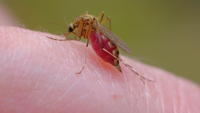DELAWARE - There’s no better way to spend the day in Delaware than enjoying the outdoors. But with the great outdoors come risks such as the transmission of disease through ticks and mosquitoes.
With the recent finding of West Nile in a Delaware mosquito, it is important to know what symptoms to look out for
Camille Moreno-Gorrin, Senior Epidemiologist for Delaware Public Health says,
“West Nile virus symptoms may range from no symptoms at all to very severe symptoms. In between may cause, milder, febrile illness meaning you know, fever, body aches, those nonspecific symptoms.”
Loose-fitting clothing and bug repellent are great for the prevention of bites, though it is not necessarily at the forefront of people’s minds.
Simon Wang of Pennsylvania admits, “usually I don't worry about the mosquitoes until they start biting me so if they do, then I'll try to break out some bug spray, but usually, at that point, it's too late.”
Mosquitoes thrive in warm and moist environments and we have seen a trend in both increasing heat and humidity, which is creating the perfect environment for mosquitoes to be able to live for longer portions of the year. The longer the first freeze of the year arrives, the longer mosquitoes survive. The sooner warm weather returns, the sooner mosquitoes return too.
There are some ways you keep your home from becoming a mosquito breeding ground…
Moreno-Gorrin explains, “sometimes water builds up or accumulates in trash cans or bird baths. So, just try to remove the water from those from those places can reduce mosquitos laying eggs”.
So before you go enjoy the beautiful parks of Delaware, remember to use mosquito repellent.
Moreno-gorrin adds that there is no vaccine or treatment for the west nile virus, so prevention is key.
If you develop any symptoms after being bitten by a mosquito, contact your doctor immediately.







